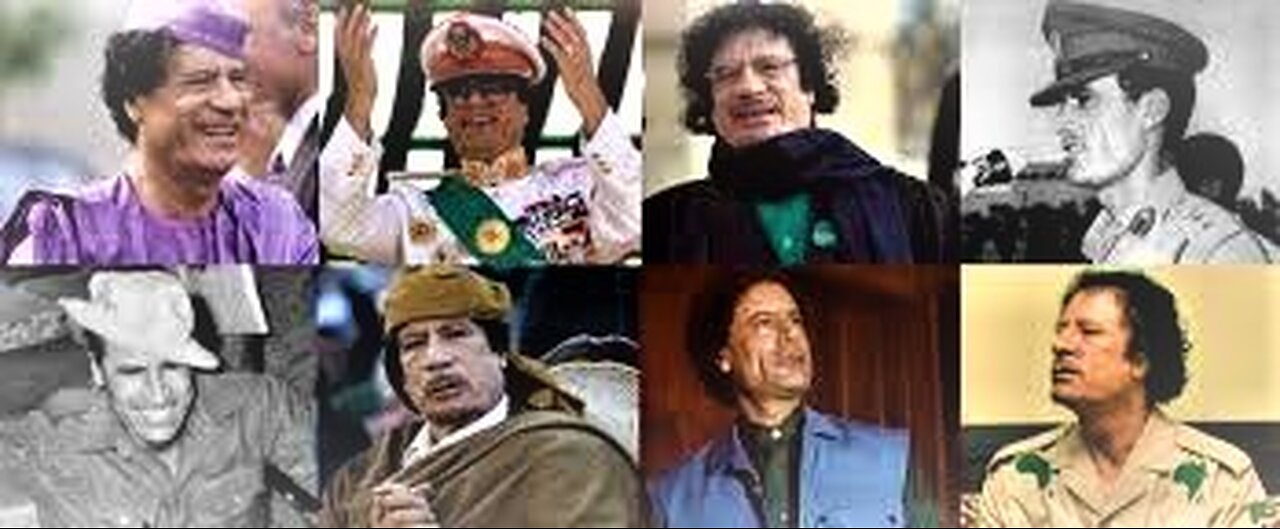Premium Only Content

Remembering Muammar Gaddafi
Following the Libyan uprising and revolution in 2011, the long-time dictator Muammar Gaddafi was overthrown and killed on the streets of Libya, ending four decades of authoritarian rule over the oil-rich North African country.
Born on 7 June 1942 in the city of Sirte, and raised in a Bedouin tent in the Libyan desert, Gaddafi belonged to a tribal family named Al-Qadhafah in an era when Libya was under Italian colonial control. The country gained independence in 1951 under the rule of King Idris, an ally of the West. In 1961, Gaddafi entered the military college in the city of Benghazi, influenced highly by the growing Arab nationalist movement and in awe of the ideology's figurehead in the form of Egyptian President Gamal Abdel Nasser.
Muammar Gaddafi in his tent with Vladimir Putin [Wikipedia]
After completing his military training, four months of which was conducted in the UK, Gaddafi graduated and began to rise steadily through the ranks of the Libyan military.
A movement of young officers emerged over the years as Libyan society gradually grew dissatisfied with King Idris; it was within this group of officers that Gaddafi's leadership began.
On 1 September 1969, while the Libyan monarch was in Turkey for medical treatment, the young officers overthrew him with Gaddafi at their head.
At the age of 27, the charismatic young man was named as chairman of the Revolutionary Command Council and commander in chief of the armed forces.
In power
Once in power, one of Gaddafi's primary concerns was ensuring that he stayed there. He particularly felt threatened following an attempted coup by his fellow officers in December 1969, as a result of which he introduced laws criminalising political protests and dissent.
A key attribute of his rule was his vehement anti-imperialism, causing him to expel Italians from Libya who had remained there following its independence; ordering the closure of British and American military bases within the country; and demanding that the foreign oil companies operating there should share more of their revenues with the government. Gaddafi also implemented cultural and religious measures against foreign and imperial influence, including the replacement of the Gregorian calendar with the Islamic version, and forbidding the sale of alcohol.
Despite his early popularity and the revival of Libyan control over the country, Gaddafi's rule became increasingly authoritarian, with an ever-smaller inner circle of trusted advisors until power was shared between him and a small group of associates and family. There were also reports of his intelligence agents traveling around the world to assassinate and intimidate dissidents and Libyans living in exile.
Throughout his rule, Gaddafi embroiled Libya in a series of conflicts – both directly and indirectly – such as the Sudanese and Lebanese civil wars, as well as with Egypt, Chad, and Tanzania; Libya was also bombed by the US in 1986. Most of these conflicts resulted in defeat, withdrawal, and stalemate for Gaddafi's Libya, with only one major victory. Nevertheless, the military interventions and alliances helped to project his image both internationally and, perhaps more importantly, on the African stage. He eventually perceived himself as "the King of Africa" and espoused a more pan-African worldview rather than one centred on Libya's Middle Eastern and Arab identity.
As well as being charismatic and then repressive, Gaddafi also became an eccentric figure, using a hand-picked group of attractive female bodyguards, replacing his suit with unusual clothes of pseudo-African design, and taking a tent to stay in whenever he travelled abroad.
His image in the international arena worsened as he not only became involved with a myriad of anti-Western movements and militant groups.
He funded the Irish Republican Army (IRA), for example, and had significant links with independence movements such as South Africa's African National Congress (ANC), whose cadres were trained in camps within Libya.
Britain broke off diplomatic relations following the killing of British policewoman Yvonne Fletcher by a Libyan diplomat at a protest outside the embassy in London in 1984. Gaddafi's Libya was then accused of being responsible for the bombing of a night club in West Berlin in 1986 as well as the 1988 bombing of Pan Am Flight 103 over the Scottish town of Lockerbie, which killed all 243 passengers and 16 crew, as well as 11 people on the ground.
West and death
From the 1990s onwards, relations between the West and Libya began to improve as Gaddafi was persuaded by South Africa's Nelson Mandela to hand over the Lockerbie suspect; he shared information with the US and British intelligence services and gave up nuclear weapons research at the behest of the West in 2003.
Gaddafi and his family, including his son Saif Al-Islam, were welcomed into Western political circles, forming personal friendships with some European leaders; UN sanctions were lifted, and he received offers for lucrative contracts from foreign oil companies who were once again willing to operate and establish themselves in Libya.
Investigations reveal the fate of Gaddafi's billions which have vanished in Belgium
In 2011, though, the "Arab Spring" began in Tunisia and swept across the Middle East and North Africa region. Tunisia's Zine El Abidine Ben Ali (1936-2019) was ousted first, followed by Egypt's Hosni Mubarak, and then – after months of protests, violence and NATO bombing campaigns – Muammar Gaddafi's government was toppled to be replaced by the rebels' National Transitional Council (NTC), which was recognised by over thirty countries as the legitimate government of Libya in July 2011.
On 20 October 2011, after months of searching for the former dictator who still had small pockets of loyal supporters, Gaddafi was found hiding in a drain in his hometown of Sirte. He was shot with his very own pistol and his corpse was dragged around the city by rebel fighters.
Legacy
Although his 40-year rule was filled with repression and injustices, Gaddafi was a peculiar figure. He developed Libya into one of the most stable and prosperous countries in Africa.
He also published his own political and economic philosophy in his famed Green Book, which outlined his critique of contemporary capitalism and liberal democracy while citing his own policies as the solution for the problems they created.
Nevertheless, he was very much a classic example of a dictator, keeping power to himself and his immediate family and close associates, with little to show from the supposedly shared ownership of the government and self-formed popular committees of which he boasted.
Muammar Gaddafi's overthrow and death left a void in the region as well as Libya, which has yet to be filled. The ongoing civil war raging in the country demonstrates that eight years after his brutal killing, the dictator's influence can still be felt in post-Gaddafi Libya.
“Gaddafi had a vision and strong belief of uniting Africans,” Sultan Kakuba, a political scientist at Kyambogo University in Uganda, told Anadolu Agency in a phone interview.
“He believed a united Africa would speak with one voice at international fora such as the United Nations and manage to bargain and be seen as an equal partner.”
Kakuba claimed Gaddafi was seen as an enemy of Western countries because of his longing for a “United States of Africa” which he pushed for many years, hoping one day to have a unified African government.
“Gaddafi believed this was the only way that Africa could develop without Western interference,” he said.
Mustafa Mheta, a Johannesburg-based researcher, said he equally believes Gaddafi was killed because of his objection to Western interference in African affairs.
“I think Gaddafi was murdered for standing up to the West and for trying to promote very progressive ideas for Africa, which the West don't like. They want a forever dependent on them Africa,” Mheta told Anadolu Agency in an interview.
In speeches, Gaddafi often outlined his plan to create a new united Africa with its own currency, an army to defend the continent, and a single passport.
He wanted to introduce a gold dinar to back African currencies, thus freeing them from the dollar standard.
Gaddafi also longed to protect Africa’s natural resources from what he referred to as Western “looters.”
Despite being a darling of most African countries, a record of human rights abuses and corruption in his own country turned many Libyans against Gaddafi. And when the winds of the 2011 Arab spring reached Libya, people held mass protests against him, giving Western armies an opportunity to move in.
Iqbal Jassat, an executive member of the Johannesburg-based think tank Media Review Network, told Anadolu Agency that Gaddafi’s support for anti-colonial struggles – especially the military and financial support provided to South Africa's liberation movements – endeared him to all who opposed to white minority rule.
“Being at odds with the dominant Western worldview saw him targeted for what they perceived as ‘supporting terrorism’,” said Jassat.
Despite being seen as a pan-African who sought African unity, Gaddafi was also accused of backing notorious rebel groups in Liberia and Sierra Leone, among others.
“As much as he was despised by the West, particularly France, Italy, Britain and America, he was also viewed as a threat to some African regimes,” Jassat said.
He said this explains why organs of the continent such as the African Union looked on without a whimper of protest in 2011, when Western armies were pummeling Libya with bombs.
Was intervention justifiable?
Most academics who spoke to Anadolu Agency argued that the March 19, 2021 NATO-led military intervention in Libya was unjustifiable because it plunged the country into total chaos.
“The Western invasion which culminated in the assassination of Col. Muammar Gaddafi is responsible for what is currently prevailing in Libya,” said Mheta.
Kakuba agreed that Western countries should have left the African Union to resolve the situation in Libya, giving the continental body an opportunity to solve an African problem.
“The invasion of Libya created a scenario that Africans cannot solve their own problems. The West should have left the African Union to resolve the crisis in Libya,” he said.
Jassat faulted some African countries, saying they let down Libya by voting with the UN Security Council in their resolution to bomb Libya.
He said South Africa also marred its reputation for failing to intervene and prevent the destruction of an ally.
Jassat said that South Africa and the rest of the continent bear responsibility for allowing former colonizers to triumphantly dismember a leading and successful Libya.
On March 17, 2011, South Africa, a non-permanent member of the United Nations Security Council, voted for Resolution 1973, which authorized military intervention in Libya allowing a NATO-led coalition to conduct fierce airstrikes against Gaddafi’s forces.
However, the country later condemned the bombing, saying NATO forces had distorted the mandate of the resolution by trying to topple Gaddafi instead of remaining neutral and protecting civilians. The African Union also expressed reservations over the NATO bombings.
Gaddafi’s death led to nearly a decade of civil war.
Libya has seen positive developments since this February, when rival parties agreed on a unified new executive authority to govern the country in the runup to national elections this December.
-
 LIVE
LIVE
TimcastIRL
47 minutes agoTrump Floats Accepting 600,000 Chinese Student Visas, MAGA Uproar | Timcast IRL
16,525 watching -
 LIVE
LIVE
Glenn Greenwald
4 hours agoGlenn Takes Your Questions on Censorship, Epstein, and More; DNC Rejects Embargo of Weapons to Israel with Journalist Dave Weigel | SYSTEM UPDATE #505
8,672 watching -
 LIVE
LIVE
Barry Cunningham
1 hour agoLISA COOK | ADAM SCHIFF | LETITIA JAMES | ARE THEY BEING SACRIFICED BY THE DEEP STATE?
3,538 watching -
 LIVE
LIVE
MattMorseTV
2 hours ago $1.22 earned🔴Trump just SHATTERED the PROJECTIONS.🔴
732 watching -
 LIVE
LIVE
megimu32
48 minutes agoOTS: From Star Search to Superstardom
218 watching -
 8:00:13
8:00:13
Dr Disrespect
9 hours ago🔴LIVE - DR DISRESPECT - GEARS RELOADED GLOBAL LAUNCH - CRUSHING LOCUST
87.4K13 -
 LIVE
LIVE
SpartakusLIVE
6 hours ago$20,000 Hide and Seek Tourney w/ Stonemountain64 || #1 Rat wins the BIG CHEESE
397 watching -
 57:00
57:00
BEK TV
22 hours agoOpen Range
1.6K -
 1:06:27
1:06:27
BonginoReport
3 hours agoBig Bad JB Threatens Trump! - Nightly Scroll w/ Hayley Caronia (Ep.120) - 08/26/2025
95.4K39 -
 1:02:26
1:02:26
Kim Iversen
4 hours agoIran Rejects Nuclear ‘Spy’ Inspectors — War Next?
40.2K80